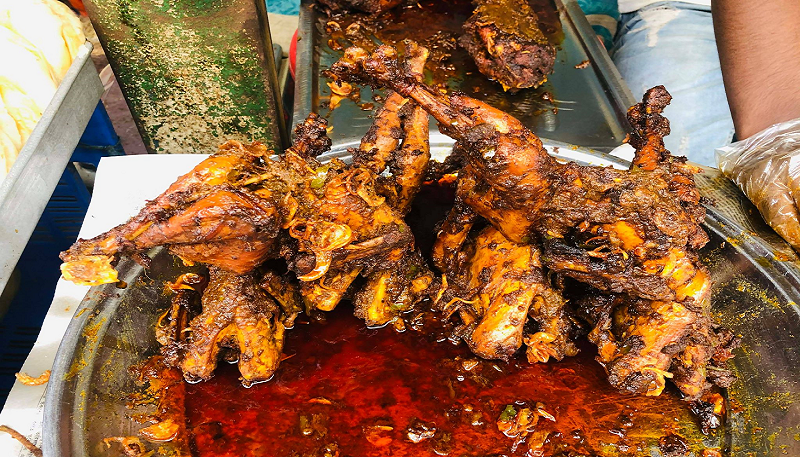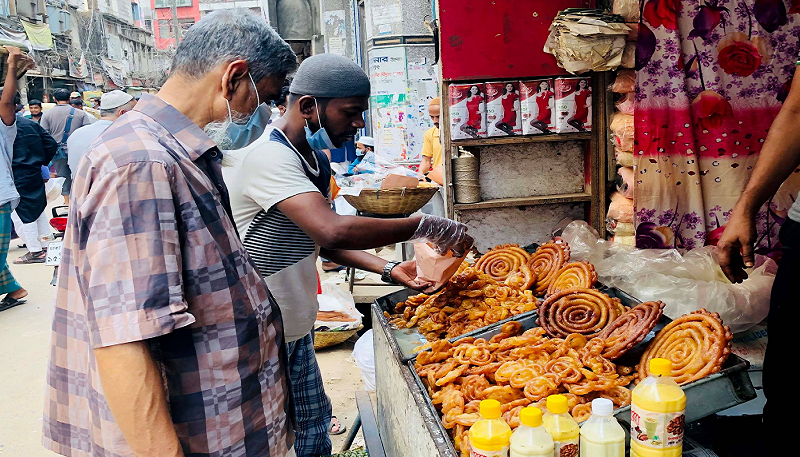
Abdullah Al Masum
Iftar traders are not happy as most of the iftar markets of the capital have worn off their signature feature — lingering waft of mouthwatering foods, din and bustle, big crowds etc.
During a visit to Chawkbazar area it was found that the once-bustling iftar market is almost desolate. It seemed that this place has lost its historical reputation of being the ‘hub of iftar’.
Normally, Chawkbazar area is abuzz with customers and sellers of iftar items during Ramadan but this year the government lockdown has driven the yummy iftar sellers out of the markets.
In Ramadan, people in their thousands throng iftar market and the sales go on in full swing but this year iftar markets including Chawkbazar, Bailey Road, Farmgate, Nabisco and Nakhalpara in the city of Dhaka wore off their signature feature.
Some of the local traders and general people have blamed the present situation of Covid-19 for the drastic fall in the iftar business.
During visit, it was seen that many shoppers were not using the gloves and masks properly while they are making or touching food and delivering the food items to customers.

Mohammed Rana, an iftar trader at Chawkbazar area, has been selling pakora, alur chop, chola, jilapi, halim and piyaju for four years but this year he could not make a profit due to the pandemic.
“I used to sell 300 kg of kebab on average per day before lockdown but now I sell only 12 kg due to ongoing pandemic,’’ said Mohammed Rana adding that due to lockdown the customers were making iftar items at home to avoid the coronavirus.
Shagor Ahmed, a resident at Chawkbazar, said that it is their family tradition to break fast with the iftar items such as pakora, alur chop, chola, jilapi, halim, doi-chira, burinda, piyaju, ruh-afza and BoroBaperPolayKhay but this year they were not getting the tasty ‘BoroBaperPolayKhay’, a mixture of chickpeas, minced meat, potatoes, brains, chira, egg, chicken, spices and ghee.
“If people buy the iftar items following all the health guidelines like me then coronavirus will not spread and the market will not be considered as a super-spreader,’’ Shagor Ahmed added.
Mohammed Bashan, an iftar trader at Bailey Road, said he cannot sell out all the iftar items, which he readies every day and half of quantity of iftar items remain unsold.

“It is happening due to low customers and maximum customer prefers homemade iftar item to takeaways,’’ Mohammed Bashan added.
It has been observed that neither the customers nor hotel staffers maintained the health guidelines properly which put them at risk of transmitting the deadly virus.
But a few customers have been seen abiding by the health directives while others did not pay heed to the health tips.
Al Mamun, a customer on Bailey Road, said he used to buy iftar items from shops but nowadays he reversed his policy of eating out as the hygiene hacks are being largely ignored in the markets.
“I see that shoppers are not following the proper health instructions and it is not a health-friendly practice. That’s why I have been preferring homemade iftars to the restaurant items since the outbreak of Covid-19,” he said.

The Bangladesh government enforced lockdown across the country, aiming at curbing Covid-19 transmission.
Later the government decided to allow shops and malls to reopen from April 25 and operate between 10am to 5:00pm every day.